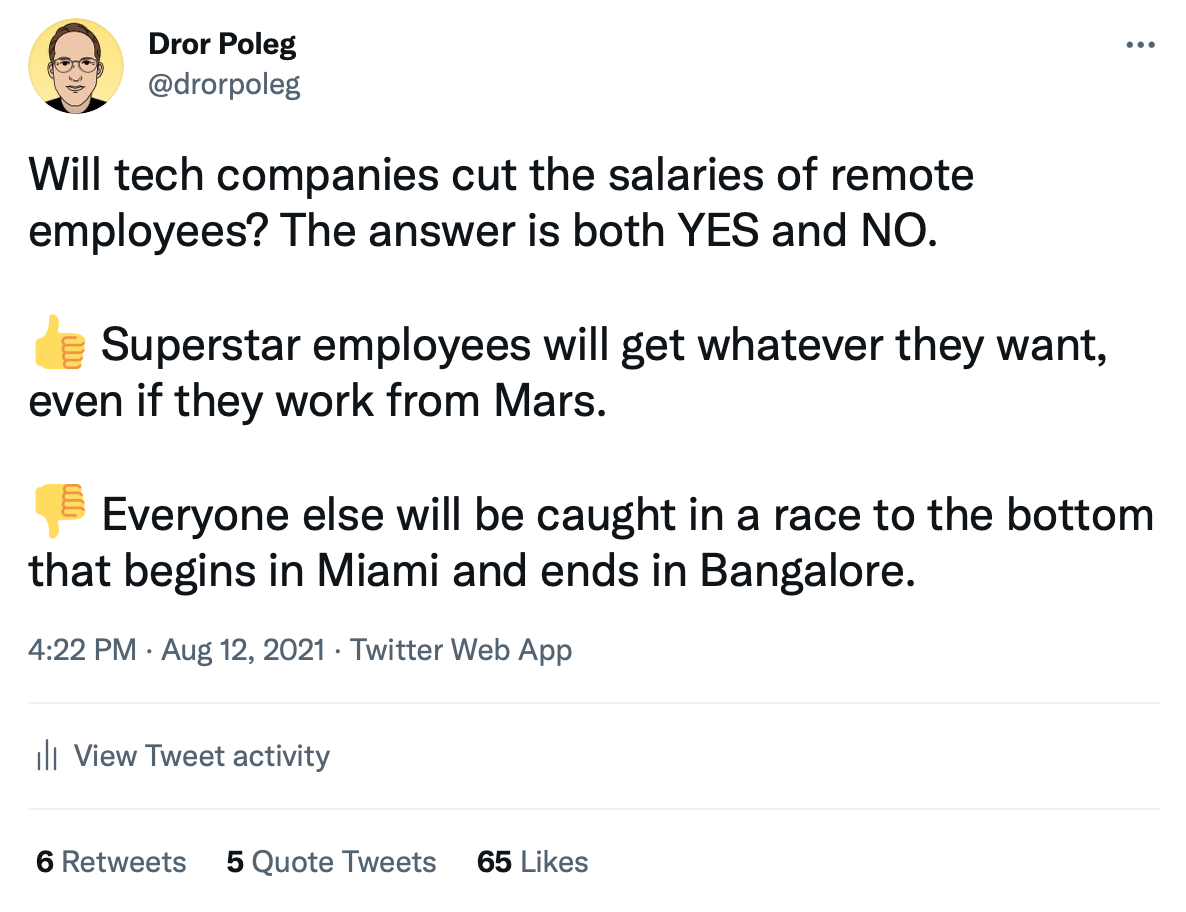
Remote and Indispensable
The footsoldiers in the war for talent are about to take a pay cut.
How did you go remote? Gradually, then suddenly. The Economist just published an analysis of job listings from a popular site for programmers. It found the share of jobs mentioning “remote” reached 75% in 2021, up from 35% pre-Covid and 13% a decade earlier.
Earlier this week, Facebook told employees they "don’t need to return to work in person until January 2022." Other companies will likely follow suit. Also this week, CBS reported that thousands of Google employees agreed to take a pay cut to work remotely or move away from their assigned office:
"Since June, roughly 10,000 of the internet company's more than 135,000 workers have asked for permission either to work remotely on a full-time basis or to relocate to a different office once COVID-19 subsides. Google has so far approved 85% of the requests. The catch? Employees who choose to work from home, or even at an office in a new city or state, often must accept pay cuts."
Note that the employees requested to work remotely after "COVID-19 subsides", not as a temporary measure to deal with infection risk, school closures, or other inconveniences. Google's decision sheds light on two of the most important question of the post-COVID world:
- Will companies cut the salaries of employee that choose to work remotely?
Yes, Google just did, and many companies will likely do the same. - Will many people choose to work remotely even if it means taking a pay cut?
For 10,000 people in one of the highest-paying organizations in the world, the answer is clearly yes.
But Google's decision also raises a third question: Isn't the company worried about employees leaving once their salary is cut? We are told there is a war for talent, so it seems peculiar that a company seeking to hire the best would take such a hostile approach towards its employees.
This conundrum makes more sense once you realize that even the most innovative companies have two types of employees: indispensable ones and interchangeable ones. Those in the "indispensable" bucket cannot be replaced, and the company will likely pay them whatever they want, regardless of where they live, as long as they can fulfill their purpose.
Things are trickier in the "interchangeable" bucket. These employees will see their pay cut up to the extent possible. In some cases, it would mean no pay cut at all, and in others, it would mean 30%. This is because even interchangeable employees are necessary and critical. Still, they are critical in the same way that footsoldiers or rank-and-file workers are necessary for an army or factory. If the army can get others for a lower price, it will. If not, it will pay what it must.
But, wait. Google is known for paying very high salaries to everyone, including its most junior and less-than-stellar veterans. If so many of its employees are interchangeable, why has it paid them so much until now?
Because of the office. When work was only done in person, the company needed everyone to be at the same place. And because the office was in the Bay Area, London, or New York, Google had to pay everyone a significant premium to ensure they can live within commuting distance.
If Google no longer needs everyone to be at the same place, it can happily pay interchangeable employees much less and have more money to pay the minority of employees it can't afford to lose. And it will need that extra money! In a remote world, indispensable employees will be courted by many more employers, and Google will have to pay more to attract and retain them. I summarized it on Twitter as follows:

The good news is that anyone can make themselves indispensable to a group of relevant employers or customers. Who falls into which bucket is not set in stone changes over time and depends on many factors — including luck.
The bad news is... that anyone can make themselves indispensable to a group of relevant employers or customers. Who falls into which bucket is not set in stone changes over time and depends on many factors — including luck.
In other words, remote means more intense competition for everyone and higher rewards for the winners. This dynamic is irreversible in a competitive economy that increasingly depends on creative talent.
Have a great weekend.
P.S.
I wrote this article tethered to my phone since a minor summer storm left me without proper internet. All this global competition, and I'm already handicapped by inferior American infrastructure! In response, I went ahead and ordered a Starlink dish so I can get my internet directly from the sky. We'll see how long it takes to get here.
